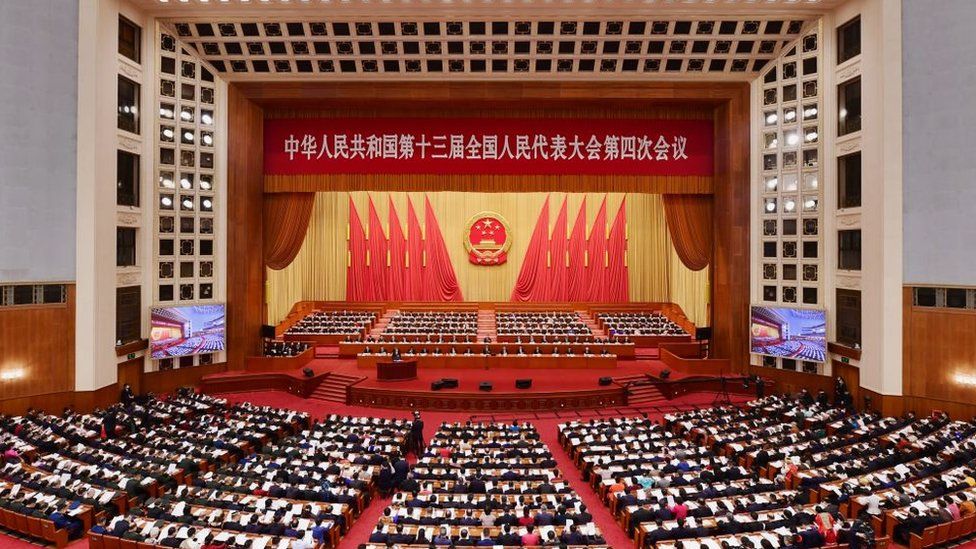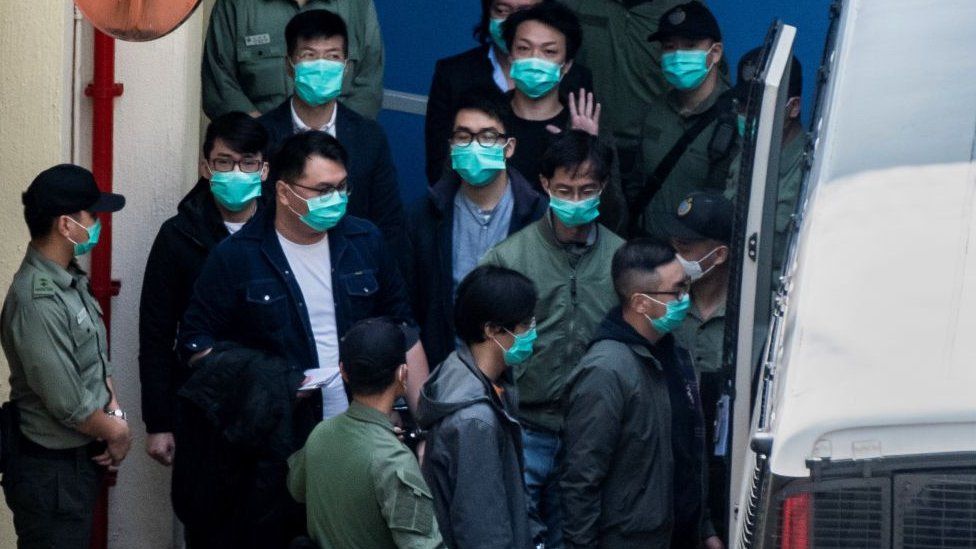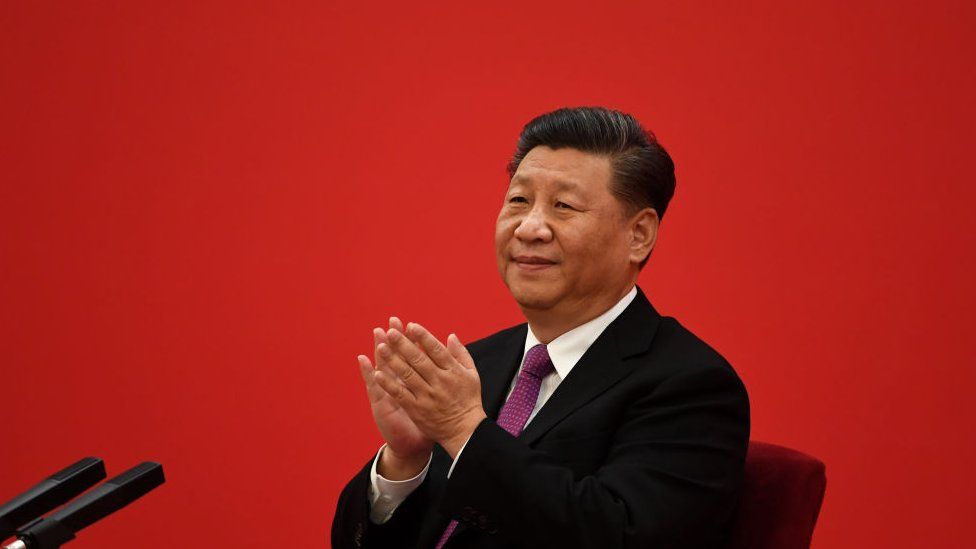China NPC: Beijing set to overhaul Hong Kong electoral system
 image copyrightGetty Images
image copyrightGetty ImagesChina announced at its biggest political meeting that it will overhaul Hong Kong's electoral system to ensure "patriots" are in charge, a sign that the government will no longer tolerate dissent in the city.
The reform comes after a crackdown and tightened control of Hong Kong.
A draft decision will be discussed during the National People's Congress (NPC), which will run for a week.
Thousands of lawmakers have gathered for the meeting in Beijing.
Besides the Hong Kong decision, the rubber-stamp parliament is expected to also discuss and approve economic growth targets and environmental policies from the central government.
What do we know about the changes planned for Hong Kong?
NPC vice-chairman Wang Chen announced on Friday that Beijing would change how the city's electoral committee is formed, and give it new powers over Hong Kong's law-making body, the Legislative Council (LegCo).
The electoral committee - which is stacked with Beijing supporters - would be able to nominate LegCo candidates and elect a "relatively large" share of its members, he said.
He did not give further details, but local media reported that the 70-member LegCo would see an increase in seats, and these additional members would be chosen by the electoral committee. This would effectively dilute the proportion of LegCo members who are directly elected by the public.
Mr Wang said the changes would fix what he called "loopholes" in Hong Kong's electoral system, which had allowed opposition activists who advocated for the city's independence to become Legco members.
The move comes after the implementation of a national security law that critics say is being used by Beijing to crush dissent in the city, and a crackdown on activists and opposition figures.
A number of arrests have been made, and last week saw 47 pro-democracy activists charged with "subversion" under the new law.
 image copyrightGetty Images
image copyrightGetty ImagesHong Kong, a former British colony, is a part of China, but has been governed under the principle of "one country, two systems", meaning it has its own legal system and rights including free speech and freedom of press.
But many in Hong Kong and rights groups have accused China of eroding those freedoms and autonomy in recent years. There were months of violent protests in 2019.
Ahead of the NPC, various Hong Kong and Chinese officials had already brought up the idea of "patriots" governing Hong Kong.
The city has been left with virtually no opposition after all of the city's pro-democracy legislators resigned last year.
But until recently, Hong Kong had a small opposition that achieved success at local elections.
"In 2019, the pan-democrats did extremely well, which was alarming to the CCP because it showed that all their negative rhetoric didn't seem to be working," Ian Chong, politics professor at the National University of Singapore, told BBC News.
"I think for the CCP (Chinese Communist Party), they really want to remove the voices that they don't like to hear."


It's kind of incredible that the Chinese government felt the need to change what was already an electoral system heavily rigged in favour of the pro-Beijing camp.
With only half the members of the territory's mini parliament directly elected, and the other half installed by political allies, why the change?
What must have spooked the Communist Party was the drubbing handed to them at the hands of pro-democracy candidates at the most recent district council elections - with those advocating democratic reform taking control of all but one municipality.
Now, after the coming electoral "rebuild" is ushered in - and it will be, given that it has been introduced to the rubber-stamp National People's Congress process - there won't be even the pretence of democratic elections in Hong Kong.
An election committee - controlled by Beijing - will not only screen all candidates standing in elections but also directly appoint "a large proportion" of the Legislative Council.
It will be almost impossible for any candidate advocating democratic change to be elected to office - and that's the way China's senior leadership likes it.

What else did China announce on Friday at the NPC?
Premier Li Keqiang said at the meeting that the country had set its economic growth target at above 6%.
Beijing did not set an economic growth target last year - the first time it chose to do so - as it was dealing with the economic fallout from the coronavirus pandemic.
Mr Li also said that Beijing will implement climate control targets, and added that China would make an action plan to ensure carbon emissions peak by 2030, in an effort to reach China's goal to be carbon neutral by 2060.
China has also pledged to develop vaccines to cope with major infectious diseases, adding that it would "concentrate resources to prevent emerging infectious disease", said Reuters.
What can we expect from the NPC in the coming days?
The congress will also formally approve the 14th Five-Year-Plan that was announced at the end of last year.
China is the only major economy in the world that publishes a five-year policy plan, and it has been doing so since 1953.
It will also be championing the "dual-circulation" model, where China will be spurring domestic consumption (or "internal circulation"), while catering to export markets overseas (or "external circulation").
Benjamin Hillman, a professor at the Australian National University, told the BBC that such goals were partly driven by concerns that the US could limit China's access to advanced technologies, like semiconductors.
Such actions, he said, "can bring companies such as Huawei to their knees, and constrain future economic growth as well as the strength of Chinese industry."
According to Prof Chong, the "success of China in dealing with Covid" is also likely to feature largely in this year's NPC.
The pandemic is largely under control in China, and for the majority of people, life has gone back to normal. China was the only major economy in the world to post growth last year.
"Next year is when President Xi Jinping was supposed to have come up to his term limit, so I think he will probably really want to burnish his credentials…I think a lot of it will be highlighting successes under Mr Xi."
China scrapped presidential term limits in 2018, which would allow Mr Xi to remain beyond his two terms.
President Xi is also likely to highlight China's achievement in "eradicating absolute poverty" - something the country announced just last week.
 image copyrightGetty Images
image copyrightGetty Images"Xi had promised that China would become a 'moderately-well off society" by 2021," said Prof Hillman.
"He will no doubt declare success at the NPC."
What is the NPC?
The meeting typically happens in early March with nearly 3,000 delegates from all around the country - representing provinces, autonomous regions, and the special administrative regions of Hong Kong and Macau.
While the NPC in theory is the country's most powerful institution, in reality the lawmakers usually end up approving plans and policies decided beforehand by the central government.
The NPC meeting runs in parallel to the Chinese People's Political Consultative Conference (CPPCC), a meeting of the most powerful political advisory body in the country.
That already began on Thursday, and collectively the gatherings are referred to as the "Two Sessions".
Reporting by Yvette Tan



No comments